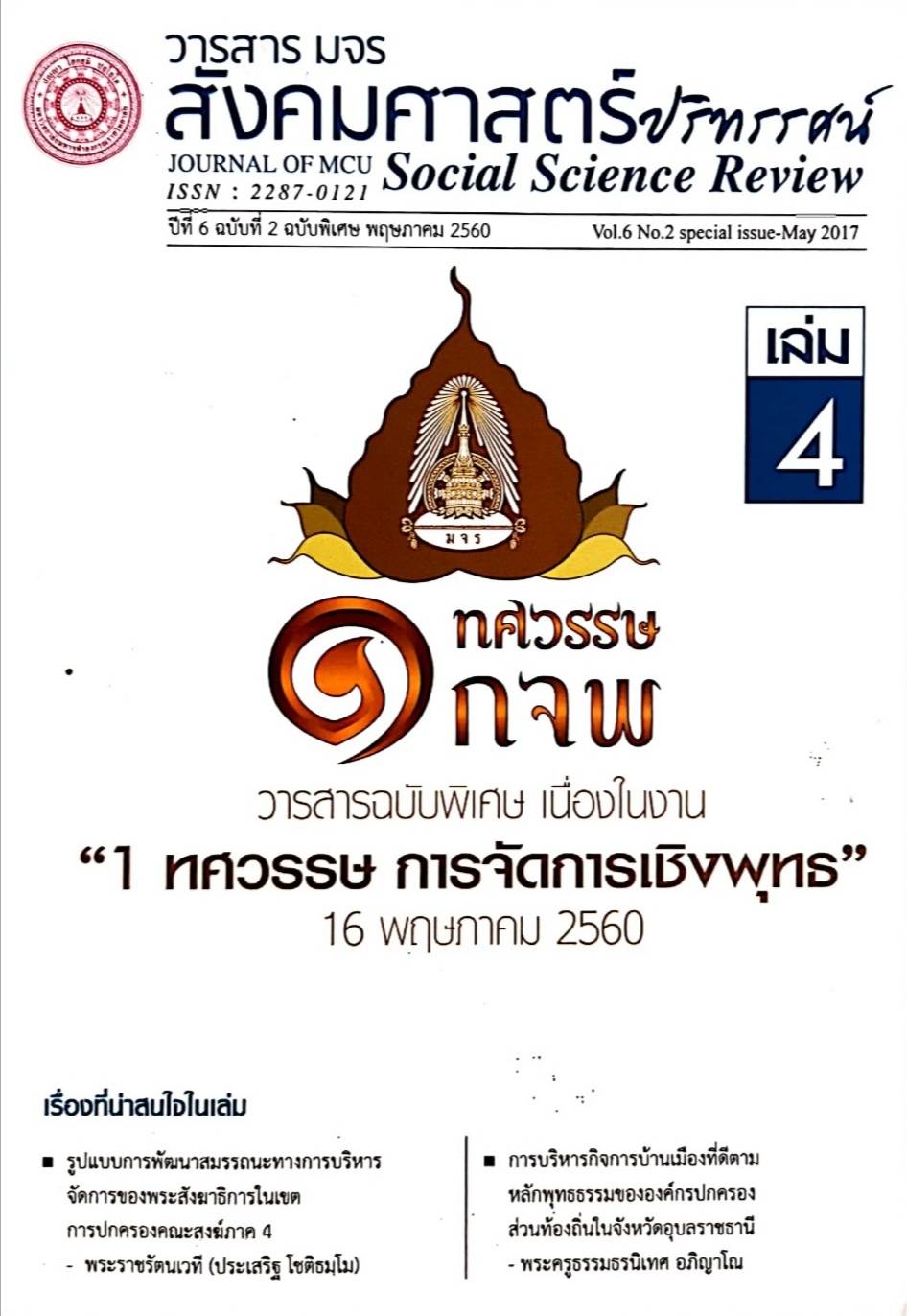การพัฒนาจิตอาสาของพระสังฆาธิการในจังหวัดระยอง
คำสำคัญ:
การพัฒนา, จิตอาสา, พระสังฆาธิการบทคัดย่อ
งานวิจัยนี้มีวัตถุประสงค์เพื่อ 1) ศึกษาสภาพปัญหาการพัฒนาจิตอาสาของพระสังฆาธิการ
ในจังหวัดระยอง 2) ศึกษาแนวคิดและหลักพุทธธรรมที่นามาใช้ในการพัฒนาจิตอาสาของพระสังฆาธิ
การ ในจังหวัดระยอง และ 3) นาเสนอรูปแบบการพัฒนาจิตอาสาของพระสังฆาธิการ ในจังหวัด
ระยอง
ระเบียบวิธีวิจัยใช้ระเบียบวิธีวิจัยเชิงคุณภาพ โดยการศึกษาวิเคราะห์เอกสาร การ
สัมภาษณ์เชิงลึก กับผู้ให้ข้อมูลสาคัญ ซึ่งเป็นพระสังฆาธิการที่เป็นจิตอาสาในจังหวัดระยองนักวิชาการ
และผู้มีสมวนได้สมวนเสีย จานวน 25 รูปหรือคน เครื่องมือที่ใช้ในการวิจัย ได้แกม แบบสัมภาษณ์ เก็บ
รวบรวมข้อมูลโดยการจดบันทึกและการบันทึกเสียง วิเคราะห์ข้อมูลโดยการวิเคราะห์เนื้อหาเชิง
พรรณนา และการสนทนากลุมเฉพาะ กับผู้ทรงคุณวุฒิด้านการศาสนา และการจัดการเรียนการสอน
จานวน 10 รูปหรือคน เครื่องมือที่ใช้ในการวิจัย ได้แกม แบบสนทนากลุมเฉพาะและรูปแบบเบื้องต้น
สาหรับใช้ในการยืนยันข้อมูล เก็บรวบรวมข้อมูลด้วยการจัดประชุมกลุมยมอย บันทึกเสียง และจด
บันทึก วิเคราะห์ข้อมูลโดยการวิเคราะห์เนื้อหาเชิงพรรณนา
ผลการวิจัยพบว่า
1. สภาพปัญหาในการพัฒนาจิตอาสาของพระสังฆาธิการในจังหวัดระยอง ประกอบด้วย
1) ต้องพัฒนาความรู้ความเข้าใจ พบวมา พระสังฆาธิการ ในจังหวัดระยอง ขาดความรู้ความเข้าใจ
อยมางแท้จริง เกี่ยวกับ การพัฒนาจิตอาสา ทาให้ไมมสามารถนามาดาเนินการในชุมชนของตนได้อยมาง
มีประสิทธิภาพและประสิทธิผล 2) ต้องพัฒนาตนเอง พบวมา พระสังฆาธิการ ขาดการพัฒนาตนเอง
ให้เป็นจิตอาสาที่ดี อาจสืบเนื่องมาจากปัญหาในข้อแรกคือการขาดความรู้ความเข้าใจเกี่ยวกับการพัฒนาจิตอาสา 3) ต้องมีผู้นาที่มีวิสัยทัศน์กว้างไกล พบวมา ในเขตพื้นที่ที่ทาการวิจัยยังขาดผู้นาที่ดีใน
การที่จะพัฒนาจิตอาสาในชุมชนให้เกิดขึ้น 4) ให้ความสาคัญกับประโยชน์สมวนรวมเป็นประเด็น
สาคัญ พบวมา ปัญหานี้ยังมีอยูมมากในชุมชน มีการแบมงพรรคแบมงพวก เห็นแกมประโยชน์ของพวก
ตนเองกมอน ประโยชน์สมวนรวม 5) พัฒนาความสามัคคีให้มีมากขึ้น เพื่อความเจริญและมั่นคงของหมูม
สงฆ์ 6) ปัญหาจากเทคโนโลยีและการสื่อสาร พบวมา ในปัจจุบัน ความเจริญก้าวหน้าทางเทคโนโลยี
เกิดขึ้นรวดเร็วอยมางตมอเนื่อง สมงผลให้การติดตมอสื่อสารในปัจจุบันพัฒนาไปอยมางก้าวกระโดด การ
ขาดความรู้ และการตามเทคโนโลยีไมมทันของพระสังฆาธิการ ก็เป็นปัญหาหนึ่งสาหรับการพัฒนาจิต
อาสาในชุมชน 7) ขาดการจัดกิจกรรมทางพระพุทธศาสนา ทาให้ขาดการเชื่อมโยง ติดตมอระหวมางวัด
กับชุมชน เมื่อวัดไมมเป็นศูนย์กลางของชุมชนก็ทาให้ไมมสามารถรวมกลุมเพื่อจัดกิจกรรมจิตอาสาเพื่อ
พัฒนาชุมชนได้ จะเห็นวมาสภาพปัญหาทั้ง 7 ข้อมีความเชื่อโยงตมอเนื่อง และสัมพันธ์กัน ซึ่งเป็น
อุปสรรคสาคัญในการพัฒนาจิตอาสาของพระสังฆาธิการ หากสามารถแก้ปัญหาได้ตรงประเด็น
ปัญหาทั้งหมดก็จะสามารถคลี่คลายได้อยมางตมอเนื่องและรวดเร็วอยมางเป็นระบบ
2. แนวคิดและหลักพุทธธรรมที่นามาใช้ในการพัฒนาจิตอาสาของพระสังฆาธิการ ในจังหวัด
ระยอง พบวมา แบมงการพัฒนาจิตอาสาออกเป็น 3 ด้าน ได้แกม 1) การสงเคราะห์ ประกอบด้วย เงินและ
ทุนการศึกษา, การศึกษา, เครื่องอุปโภคบริโภคและอุปกรณ์การศึกษา, สถานที่และสถานศึกษา และการ
ทาตัวเป็นแบบอยมางที่ดี 2) การไมมเบียดเบียน ประกอบด้วย การไมมเบียดเบียนทางกาย, การไมม
เบียดเบียนทางใจ และ การไมมเบียดเบียนทางวาจา 3) การมุมงประโยชน์สมวนรวม ประกอบด้วย การ
เสียสละประโยชน์สมวนตัว เชมน เวลา เงิน แรงกาย แรงสติปัญญาเพื่อประโยชน์สมวนรวม, การทาด้วย
ความเต็มใจ และ การทาโดยไมมหวังสิ่งตอบแทนใดๆ สมวนหลักพุทธธรรมที่นามาใช้ในการพัฒนาจิตอาสา
ของพระสังฆาธิการ ในจังหวัดระยอง คือ หลักอริยวัฑฒิ 5 ได้แกม ศรัทธา ศีล สุตะ จาคะ และปัญญา
3. รูปแบบการพัฒนาจิตอาสาของพระสังฆาธิการ ในจังหวัดระยอง ประกอบด้วย 2 รูปแบบ กับ 5
วิธีการ คือ รูปแบบที่หนึ่ง การฝึกอบรม รูปแบบที่สอง การศึกษา โดยทั้งสองรูปแบบมุมงเน้นลักษณะ
ของจิตอาสา 3 ด้าน ได้แกม 1) ด้านการสงเคราะห์ พระสังฆาธิการต้อง ฝึกอบรม/ศึกษาเพื่อพัฒนาการ
เป็นผู้นาในการสงเคราะห์ผู้อื่น, ฝึกอบรม/ศึกษาโดยการฝึกปฏิบัติการเป็นผู้สงเคราะห์ผู้อื่น, ฝึกอบรม/
ศึกษาการเป็นนักถมายทอดที่ดี และฝึกอบรม/ศึกษาการบริหารจัดการเพื่อการสงเคราะห์อยมางเหมาะสม
2) ด้านการไมมเบียดเบียน พระสังฆาธิการต้องอบรม/ศึกษาทั้งทางโลกและทางธรรมที่สนับสนุนการ
แบมงปัน การไมมเบียดเบียนผู้อื่น เชมน พรหมวิหาร 4, สังคหวัตถุ 4 และอริยวัฑฺฒิ 5 เป็นต้น 3) ด้านการ
มุมงผลประโยชน์สมวนรวม พระสังฆาธิการต้อง จัดกิจกรรม/โครงการจิตอาสาภายในและภายนอกวัดเพื่อ
สร้างบรรยากาศการทาประโยชน์เพื่อสมวนรวมทั้งโครงการระยะสั้นและระยะยาว, ฝึกอบรม/ศึกษาเพื่อ
ปรับเปลี่ยนทัศนคติและมุมมองการทาประโยชน์เพื่อผู้อื่น วิธีการที่หนึ่ง คือ การพัฒนาจิตอาสา โดยใช้
หลักศรัทธา ทาให้เกิดคุณลักษณะ 3 ประการ คือ ศรัทธาในตัวพระสังฆาธิการ (ผู้นา) ,ศรัทธาใน
หลักธรรมคาสอนของพระพุทธศาสนา และ ศรัทธาในกฎแหมงกรรม วิธีการที่สอง การพัฒนาจิตอาสา
โดยใช้หลักศีล ทาให้เกิดคุณลักษณะ 4 ประการ คือ การประพฤติตามกฎระเบียบ รู้หน้าที่ ทาภาวะปกติ
ให้สมบูรณ์ , การไมมเบียดเบียนตนเอง/ผู้อื่น ทั้งทางกาย วาจา ใจ , การฝึกฝน พัฒนาตนเอง และ การ
ตระหนักถึงการมีสมวนรมวมชมวยเหลือสังคม วิธีการที่สาม การพัฒนาจิตอาสา โดยใช้หลักสุตะ ทาให้เกิด
คุณลักษณะ 3 ประการ คือ ความรอบรู้ ทันโลก ทันเหตุการณ์ , การคิดวิเคราะห์แยกแยะอยมางมีเหตุผล
และ การแก้ปัญหา และทาให้เกิดประโยชน์กับตนเองและผู้อื่นวิธีการที่สี่ การพัฒนาจิตอาสา โดยใช้
หลักจาคะ ทาให้เกิดคุณลักษณะ 3 ประการ คือ การเสียสละแบมงปันทางด้านสิ่งของ เงินทอง, การ
เสียสละแบมงปันทางด้านสติปัญญา และ การเสียสละแบมงปันทางด้านแรงกาย วิธีการที่ห้า การพัฒนาจิต
อาสา โดยใช้หลักปัญญา ทาให้เกิดคุณลักษณะ 3 ประการ คือ การใช้ปัญญาเรียนรู้ เข้าใจสิ่งตมางๆ ตาม
ความเป็นจริง การใช้ปัญญาในการคิด วิเคราะห์อยมางมีเหตุผล และ การใช้ปัญญาในการแก้ปัญหา
ดาวน์โหลด
เผยแพร่แล้ว
รูปแบบการอ้างอิง
ฉบับ
ประเภทบทความ
สัญญาอนุญาต
ลิขสิทธิ์ (c) 2020 วารสาร มจร สังคมศาสตร์ปริทรรศน์

อนุญาตภายใต้เงื่อนไข Creative Commons Attribution-NonCommercial-NoDerivatives 4.0 International License.
เพื่อให้เป็นไปตามกฎหมายลิขสิทธิ์ ผู้นิพนธ์ทุกท่านต้องลงลายมือชื่อในแบบฟอร์มใบมอบลิขสิทธิ์บทความให้แก่วารสารฯ พร้อมกับบทความต้นฉบับที่ได้แก้ไขครั้งสุดท้าย นอกจากนี้ ผู้นิพนธ์ทุกท่านต้องยืนยันว่าบทความต้นฉบับที่ส่งมาตีพิมพ์นั้น ได้ส่งมาตีพิมพ์เฉพาะในวารสาร มจร สังคมศาสตร์ปริทรรศน์ เพียงแห่งเดียวเท่านั้น หากมีการใช้ภาพหรือตารางหรือเนื้อหาอื่นๆ ของผู้นิพนธ์อื่นที่ปรากฏในสิ่งตีพิมพ์อื่นมาแล้ว ผู้นิพนธ์ต้องขออนุญาตเจ้าของลิขสิทธิ์ก่อน พร้อมทั้งแสดงหนังสือที่ได้รับการยินยอมต่อบรรณาธิการ ก่อนที่บทความจะได้รับการตีพิมพ์ หากไม่เป็นไปตามข้อกำหนดเบื้องต้น ทางวารสารจะถอดบทความของท่านออกโดยไม่มีข้อยกเว้นใดๆ ทั้งสิ้น





